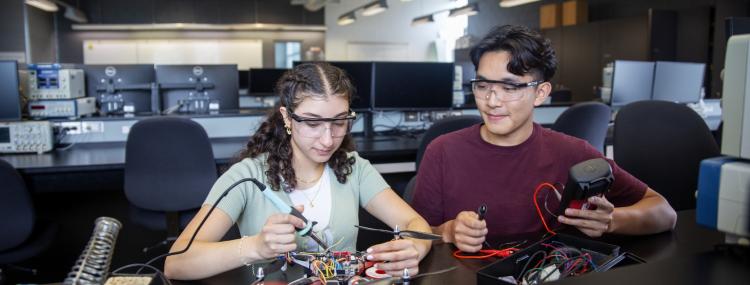New foundations for Canada's future are being built at the University of Guelph, as two colleges open their doors to cutting-edge science and engineering education.

New College of Engineering and College of Computational, Mathematical and Physical Sciences aims to prepare next generation of scientists and leaders with interdisciplinary education (Photo credit: Hillary Rooyakkers)
The new College of Engineering (COE) and College of Computational, Mathematical and Physical Sciences (CCMPS) have officially launched, created from the former College of Engineering and Physical Sciences (CEPS).
The growth of their respective programs has made it clear that two distinct colleges, built with more aligned administrative structures, will better serve U of G students, faculty and industry partners.
All School of Engineering academic programs are now part of COE, including the Morwick G360 Groundwater Research Institute. All physical sciences, mathematics, statistics and computer science programs are now part of CCMPS.
With renewed focus on their distinct expertise, both colleges will continue to support their students in meeting the demands of industry and today's job market.
Among many priorities are addressing the skills gap for job-ready scientists, strengthening Canada's capacity in artificial intelligence and conducting innovative research - from fundamental, subatomic-level discoveries to applications that support advanced medicine, sustainable food production and net-zero solutions.
"Our province and economy face greater challenges than ever," says Dr. Moncef Nehdi, inaugural dean of COE. "The new College of Engineering signals that we are not only keeping pace but leading in areas where Canada and the world urgently need solutions."
Dr. Stacey Scott, inaugural interim dean of CCMPS, says, "Today's employers are seeking graduates with technical expertise, data skills and sophisticated problem-solving abilities to tackle complex challenges responsibly. The launch of CCMPS represents a bold step toward meeting that demand for innovation, data-driven discovery and advanced, human problem solving."
The expansion is a significant chapter in the University's history, says Dr. Rene Van Acker, U of G president and vice-chancellor. The University has not added a new college since 2006, when the University created a college for business and economics education, now the Gordon S. Lang School of Business and Economics.
"At the University of Guelph, we are building the foundations that prepare our students, faculty and staff to thrive in a world of constant change," says Van Acker. "As we enter this new chapter, our progress will continue to be shaped by the needs of industry and society, ensuring we make the greatest impact where it matters most."
New programs launching in both colleges
U of G students will see immediate benefits to their careers and a distinct student experience in each college.
Higher employability and faster career acceleration will be addressed with enhanced courses, co-ops and new undergraduate and graduate degrees already underway.
For instance, the University launched a Master of Engineering Management and an undergraduate major in Mechatronics Engineering to fill a gap in engineering leadership positions and to build knowledge on advanced intelligent systems. Both programs, introduced earlier this year, are already proving popular among hundreds of applicants.
Launching with four new academic units, COE will provide two new majors, civil engineering and electrical engineering in fall 2026.
Meanwhile, CCMPS intends to introduce new undergraduate programming in data science and artificial intelligence, and new graduate programming in toxicology, science communications and health informatics (in collaboration with the Ontario Veterinary College), and Human-Centred Artificial Intelligence over the next two years.
"Whether it's developing human-centred Al solutions, advancing climate solutions or space exploration, or innovating in biotechnology, graduates will be prepared for high-demand careers that will shape the future of Canada and the world," says Scott.
Colleges to build unique identities in research, education
Both COE and CCMPS are distinct from peer universities in offering interdisciplinary education that emphasizes entrepreneurship and human skills to train well-rounded scientists.
"We want to focus on engineering as a force for public good," Nehdi says, "where our graduates are not only technically brilliant, but also ethical, entrepreneurial, inclusive and deeply connected to community."
COE will continue its research impact on the Canadian economy through innovations in advanced manufacturing, agri-food engineering, sustainable materials, environmental stewardship and AI-driven systems.
Complementing this, CCMPS will continue to advance knowledge in AI theory and applications, human-centred technology design, cybersecurity, data science, clean energy, advanced materials, biotechnology and biophysics for next-generation medicine - "areas that reinforce U of G's reputation as a hub of innovative, interdisciplinary research," says Scott.
Both colleges will mark the launch with celebratory events for students, staff, faculty and supporters.
For more information, visit the official COE and CCMPS websites.













